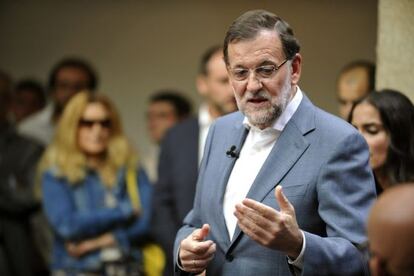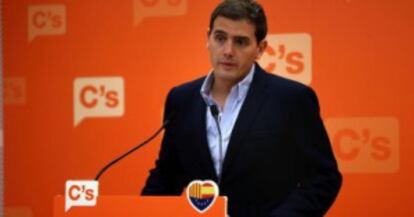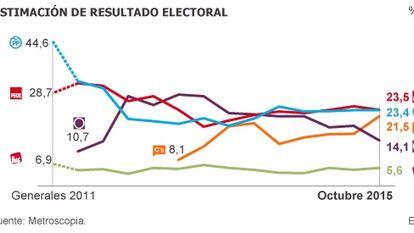Popular Party starts to draw red lines for potential post-electoral pacts
Governing party assuming it will have to negotiate with Ciudadanos in wake of polls But it says it will not let the emerging group dictate who will be prime minister


The governing Popular Party is already assuming that it will be practically impossible for it to win back its current absolute majority at upcoming general elections, which have been called in Spain for December 20. As such, the center-right party, currently led by Prime Minister Mariano Rajoy, is working on possible post-election scenarios.
We are not going to allow Ciudadanos to decide or determine who is our candidate,” said a PP source
The first of these will be to continue in government, albeit without a majority, but with the support of Ciudadanos. Founded in 2005, the emerging group was first formed in Catalonia as a non-nationalist party. Since then it has made the jump to national politics, and secured a presence in most regions at the May regional and municipal elections. With a mix of progressive liberalism and social democracy, and a message of democratic regeneration, Ciudadanos has allied itself with both the PP and the PSOE at the regional level after forcing would-be premiers to sign a list of anti-corruption measures, something that has appealed to voters given the series of scandals that has hit the main parties in recent years.

The PP believes that such an agreement with Ciudadanos at a national level in the wake of the December elections is perfectly viable, but it wants to anticipate a possible demand from the party, led by Albert Rivera: “The head of Rajoy is untouchable.” That is the “red line” that has been drawn by three different members of the PP’s leadership. Everything else is up for negotiation.
“Ciudadanos can ask for and demand to negotiate whatever it likes, and we are open to talk about anything,” one of these sources said. “But we are not going to allow them to be the ones who decide or determine who is our candidate.”
The Ciudadanos phenomenon, and in particular its young and charismatic leader, Albert Rivera, is worrying for the PP, given its popularity among its traditional voter base. But the PP insists that its main rival continues to be the opposition Socialist Party (PSOE), as has been the case in Spain’s traditional two-party system, which has been in place since the return of democracy in the late 1970s and could for the first time be swept away in these key December elections.
The campaign, as such, PP sources say, will be one of “tough and direct” confrontation with the PSOE leader Pedro Sánchez, given that he is the leader with the greatest chance of becoming prime minister.
For its part, the Socialists will be looking to fight the elections of the center-right. That is where Pedro Sánchez is hoping to do battle with Ciudadanos and win votes that have gone to another new party, leftist anti-austerity group Podemos. The Socialists are aiming to push Albert Rivera’s party to the right, painting them as “modern and affable, but right-wing.”
Poll reveals decisive role will be played by Ciudadanos

An opinion poll published at the weekend, and carried out by Metroscopia, reveals that Ciudadanos will play a decisive role at the general elections. The group is forecast to take 21.5 percent of the vote, narrowly losing out to the PP, with 23.4 percent, and the PSOE, with 23.5 percent.
New leftist anti-austerity party Podemos, meanwhile, would take 14.1 percent of the vote, according to the opinion poll.
The poll predicts, then, that the Socialists would win the elections but in a virtual tie with the PP. The five percentage points that Ciudadanos have gained since the last survey, released just a month ago, would give the party a decisive roll in the political scene that would be revealed in the wake of the December polls.
On September 27, Ciudadanos won 18 percent of the votes at the Catalan regional elections, taking 25 seats in parliament. What’s more, a Metroscopia poll also puts them at the head of voter intention in the Valencia region, traditionally a stronghold for the Popular Party.







































